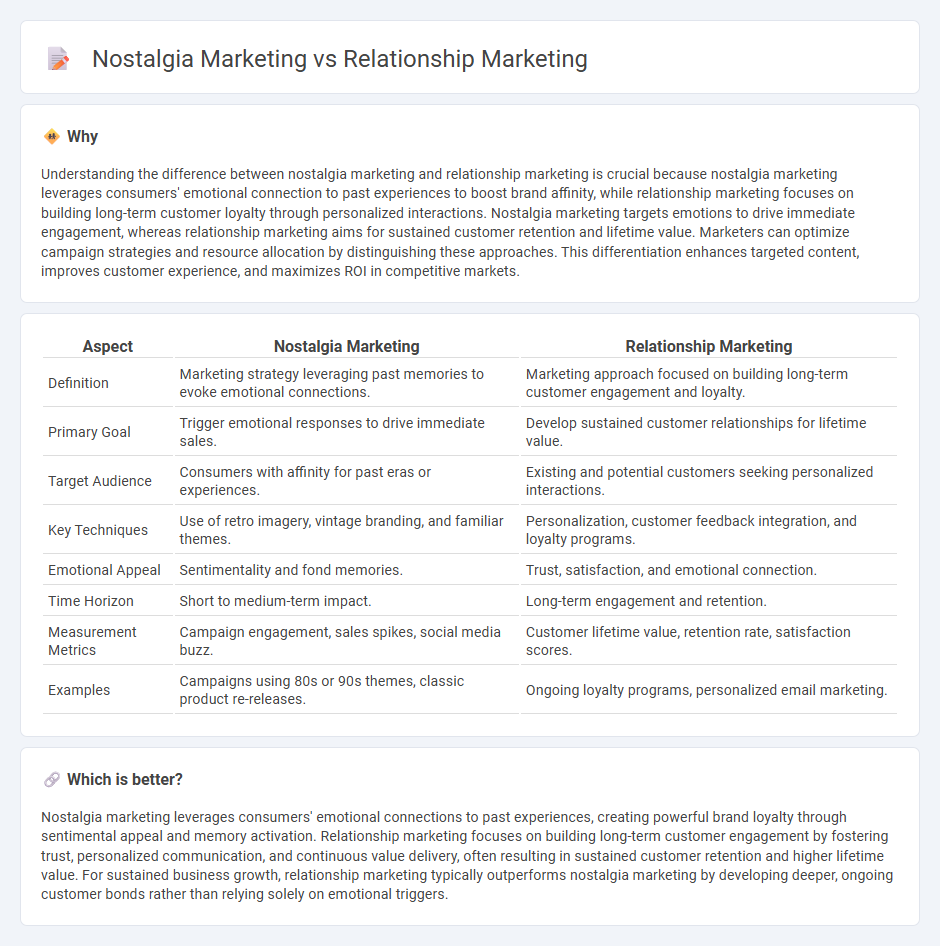
Nostalgia marketing leverages consumers' emotional connections to past experiences, fostering brand loyalty through sentimental appeal and cultural memories. Relationship marketing focuses on building long-term customer engagement and personalized interactions to enhance satisfaction and repeat business. Explore how these strategies uniquely influence consumer behavior and drive marketing success.
Why it is important
Understanding the difference between nostalgia marketing and relationship marketing is crucial because nostalgia marketing leverages consumers' emotional connection to past experiences to boost brand affinity, while relationship marketing focuses on building long-term customer loyalty through personalized interactions. Nostalgia marketing targets emotions to drive immediate engagement, whereas relationship marketing aims for sustained customer retention and lifetime value. Marketers can optimize campaign strategies and resource allocation by distinguishing these approaches. This differentiation enhances targeted content, improves customer experience, and maximizes ROI in competitive markets.
Comparison Table
| Aspect | Nostalgia Marketing | Relationship Marketing |
|---|---|---|
| Definition | Marketing strategy leveraging past memories to evoke emotional connections. | Marketing approach focused on building long-term customer engagement and loyalty. |
| Primary Goal | Trigger emotional responses to drive immediate sales. | Develop sustained customer relationships for lifetime value. |
| Target Audience | Consumers with affinity for past eras or experiences. | Existing and potential customers seeking personalized interactions. |
| Key Techniques | Use of retro imagery, vintage branding, and familiar themes. | Personalization, customer feedback integration, and loyalty programs. |
| Emotional Appeal | Sentimentality and fond memories. | Trust, satisfaction, and emotional connection. |
| Time Horizon | Short to medium-term impact. | Long-term engagement and retention. |
| Measurement Metrics | Campaign engagement, sales spikes, social media buzz. | Customer lifetime value, retention rate, satisfaction scores. |
| Examples | Campaigns using 80s or 90s themes, classic product re-releases. | Ongoing loyalty programs, personalized email marketing. |
Which is better?
Nostalgia marketing leverages consumers' emotional connections to past experiences, creating powerful brand loyalty through sentimental appeal and memory activation. Relationship marketing focuses on building long-term customer engagement by fostering trust, personalized communication, and continuous value delivery, often resulting in sustained customer retention and higher lifetime value. For sustained business growth, relationship marketing typically outperforms nostalgia marketing by developing deeper, ongoing customer bonds rather than relying solely on emotional triggers.
Connection
Nostalgia marketing leverages consumers' sentimental memories to create emotional bonds, enhancing brand loyalty that is central to relationship marketing. By evoking positive past experiences, brands foster deeper connections, encouraging repeat engagement and long-term customer retention. This emotional resonance strengthens personalized communication strategies, making relationship marketing more effective through trust and familiarity.
Key Terms
**Relationship Marketing:**
Relationship marketing centers on building long-term connections with customers by emphasizing personalized communication, trust, and customer retention strategies. It leverages data-driven insights to tailor experiences that foster loyalty and enhance brand advocacy. Explore how relationship marketing can transform customer engagement and drive sustained business growth.
Customer Loyalty
Relationship marketing builds customer loyalty by fostering long-term engagement through personalized communication, trust, and consistent value delivery, resulting in higher retention rates and increased lifetime customer value. Nostalgia marketing leverages emotional connections by evoking positive memories from the past, creating a sense of brand affinity that can enhance loyalty among specific demographics, especially older generations. Explore how combining these strategies can maximize customer loyalty and strengthen brand relationships.
Engagement
Relationship marketing prioritizes long-term customer engagement by fostering trust and personalized interactions, enhancing brand loyalty and repeat business. Nostalgia marketing taps into consumers' emotional connections to past experiences, driving engagement through sentimental appeal and brand reminiscence. Explore how each strategy maximizes engagement to tailor your marketing approach effectively.
Source and External Links
What Is Relationship Marketing? | Definition from TechTarget - Relationship marketing is a customer relationship management approach focused on building customer loyalty and long-term engagement through strong emotional connections, contrasting with traditional transactional marketing which targets individual sales.
Relationship Marketing: The Ultimate Guide | Referral Rock Blog - Relationship marketing is a strategy emphasizing customer retention, satisfaction, and lifetime value by fostering emotional connections and open communication, leading to higher revenue and increased customer loyalty.
Relationship Marketing: 5 Ways to Create Lifelong Customers - Relationship marketing builds close emotional connections with customers through purpose-driven engagement, leveraging brand community, feedback, and exclusive offers to create loyalty and evangelism.
 dowidth.com
dowidth.com